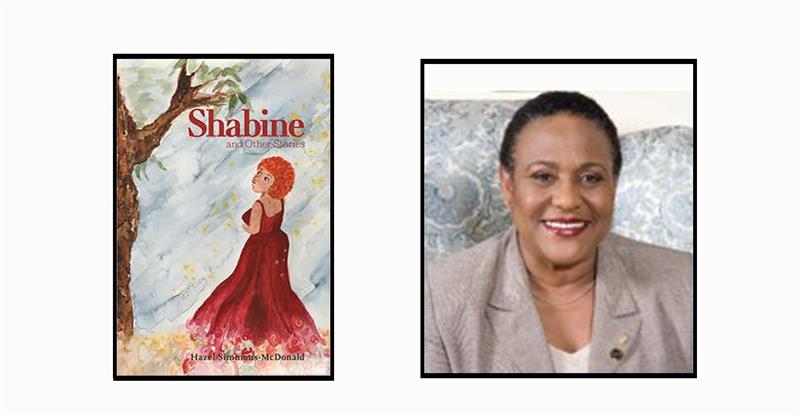DR. SIMMONS WAS AWARDED THE PRESTIGIOUS SAINT LUCIA CROSS DURING THE INDEPENDENCE 2022 NATIONAL AWARDS FOR HER WORK IN EDUCATION AND CREOLE LANGUAGE RESEARCH.
A review of Shabine and o ther stories by Hazel Simmons-McDonald SLC
ther stories by Hazel Simmons-McDonald SLC
Hazel Simmons-McDonald SLC, is a Saint Lucian who has lived and worked in Barbados for over thirty years. She is professor Emerita of Applied Linguistics at the UWI and has published text books on language learning as well as several articles on Educational issues in Creole and Creole-influenced vernacular contexts. Although in retirement, she continues to do research in this field and also devotes time to creative writing.
She was awarded the prestigious Saint Lucia Cross in the Independence 2022 National Awards in recognition of her regional work in education and Creole language research.
She has published poems in journals, including The Malahat Review, The Literary Review, The Atlanta Review, Poui, Pathways, Calabash, BIM, Acalabash.com and selected anthologies. Her short fiction has been published in BIM, Poui, Thicker than Water (Peekash 2018), and won a prize in the Frank Collymore Literary Endowment for a short collection of fiction in 2018. Her first collection of poetry, Silk Cotton & other trees was published by Ian Randle Publishers in 2004. Shabine and Other Stories was issued by the UWI Press in December 2021.
Many of the stories in Shabine explore related themes of unrequited attractions, disintegration of relationships under difficulties of communication, areas of a mental otherness and emotional distress that manifests in other-worldly experiences as borders of consciousness are crossed. Ms. Simmons-McDonald imagines what I have called a “creole magical realism” where the boundaries between life and death, the real and imagined are very porous and her characters pass through those thin veils at moments of high emotion or anxiety. Tragedy and death are interwoven into lives that have known betrayal, unplanned moral failure, loneliness, and redemption.
The stories are set in a recognizable Saint Lucia of an earlier generation. The author’s familiarity with the folklore of her native island allows her to draw on popular myths and beliefs of the supernatural realm which she makes a natural part of the lives of her characters and their stories. There I find the unique “creole magical realism” of this short fiction, which is handled lightly, without self-conscious manipulation.
But while these are placed in a historical time, and within a certain Creole ethos, the stories and themes strike a very contemporary chord. The stresses of relationships that can lead to emotional and mental escape routes will be familiar and perhaps uncomfortably so. The unrequited affection of the title story evokes regret for past opportunities for love. “Mirror” raises the spectre of the recurrence within families of generational failures, with the possibilities of disastrous consequences. Class and colour issues of Caribbean life with their related deep psychological ramifications find a nightmarish end in several stories. Sexual frustration and sexual harassment (and this last within a church setting) are familiar topics today, and even more broadcast than in the period during which the stories unfold.
“Torn Pages” a story of a husband’s twice unplanned unfaithfulness, resulting in two children outside of his marriage, is compassionately and sensitively handled. The author does not carry a judgemental big stick, but leaves the facts of her fiction, which could be easily mirrored in our Caribbean world, to the evaluation of her readers.
In the final stories “Dear Departed,” “Imogene,” “Boloms” she travels the territory of death, grief and the realm of spirits where ghosts of the unborn aborted, boloms, become agents of redemption.
Hazel Simmons-McDonald has presented, in a meditative way, even-handedly, stories that are “creole” in tenor, in theme, in the sense that they are rooted in her Caribbean, Saint Lucia in particular. She portrays a society with its African and French-Creole inspired folklore and language, its mid-twentieth century social life, recognizable human relationships, their disappointment, pain, emotional confusion, and yes, psychological crossings into areas of mental otherness which are often just outside the doors of “normal” perception.
Shabine and other stories is another contribution by one of our writers to the growing Caribbean literature that continues to expand its thematic and stylistic boundaries within and outside of our island archipelago world and its diasporas. The Sant Lucian literary bibliography is also extended as Ms. Simmons-McDonald joins earlier and present writers with this original contribution.
Congratulations to her publisher The University of the West Indies Press who regularly brings us a variety of talents and thought-provoking writers in various academic and creative fields.
John Robert Lee is a Saint Lucian writer. His Belmont Portfolio, Poems, is forthcoming from Peepal Tree Press in 2023.